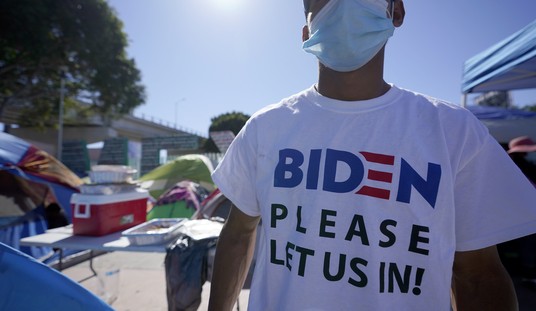CBS News may have embarrassed itself this morning over its attempt to slough off inflation and supply chain issues as “due to the Ukraine crisis,” but it did highlight one major political issue for Joe Biden. Even before the threat of war spooked commodities investors into hiking the price of oil futures, the rapid price increases at the pumps both led and multiplied the inflationary wave in the US. The Ukraine crisis might give Biden some momentary breathing room on rapid price hikes to come, but such a respite will be short-lived.
As the New York Times notes today, Biden’s not the only world leader suddenly finding themselves in this political conundrum of their own making:
It was only three months ago that world leaders met at the Glasgow climate summit and made ambitious pledges to reduce fossil fuel use. The perils of a warming planet are no less calamitous now, but the debate about the critically important transition to renewable energy has taken a back seat to energy security as Russia — Europe’s largest energy supplier — threatens to start a major confrontation with the West over Ukraine while oil prices are climbing toward $100 a barrel.
For more than a decade, policy discussions in Europe and beyond about cutting back on gas, oil and coal emphasized safety and the environment, at the expense of financial and economic considerations, said Lucia van Geuns, a strategic energy adviser at the Hague Center for Strategic Studies. Now, it’s the reverse.
“Gas prices became very high, and all of a sudden security of supply and price became the main subject of public debate,” she said.
The renewed emphasis on energy independence and national security may encourage policymakers to backslide on efforts to decrease the use of fossil fuels that pump deadly greenhouse gases into the atmosphere.
They did more than just prioritize climate-change policies over “financial and economic considerations.” World leaders actively pushed for higher prices on fossil fuels (even clean-burning natural gas) as a way to (a) fund subsidies for far-less-reliable solar and wind technologies, and (b) use those subsidies to make those green-energy sources look competitive. This isn’t a case of recalculating priorities in a crisis — it’s a case of Be careful what you wish for materializing in spades.
For right now, the Washington Post reports, these same leaders are crossing their fingers and hoping that Vladimir Putin doesn’t use his energy-export leverage. They should be thinking the other way around:
Russia’s ability to continue serving as one of the world’s largest oil and gas suppliers will depend on several factors: whether Western sanctions disrupt Russian exports; whether conflict damages Russian export pipelines traveling through Ukraine; and whether Russia curbs its exports to punish the West.
For now, analysts said they don’t see a high likelihood of serious supply disruptions, noting that Russia can’t just shut down its oil and gas wells without major expense. But fears of widening conflict still pushed prices higher Tuesday, with West Texas Intermediate crude oil edging up 1 percent to $92.30 a barrel and European natural gas prices rising more than 10 percent to 80 euros ($90.65) per megawatt-hour.
“I still don’t think that we understand what the full implications are for energy markets writ large, and that’s because there is this really glaring uncertainty as to whether [Monday’s] actions in regard to [Ukraine] represent the end state of what Mr. Putin intends to do or simply a starter course,” said Jonathan Elkind, senior research scholar at Columbia University’s Center for Global Energy Policy and a former energy official in the Clinton and Obama administrations.
President Biden on Tuesday said he will strive to contain price spikes related to the conflict, which could exacerbate already sharp inflation rates that are vexing consumers and the White House.
“I want to limit the pain the American people are feeling at the gas pump,” Biden said from the White House. “This is critical to me.”
You’d better believe it’s “critical” for Biden’s political standing. His approval numbers have plunged for months and still haven’t found a floor thanks to a number of policy fumbles, but inflation is one of the keys and gas prices perhaps the most visible aspect of it to consumers. According to the EIA’s official data, average prices at the pump have risen 42% during the first full year of Biden’s presidency, and 11% since significant inflation first emerged in May.
At some point, Biden will have to make a choice between energy consumers that could give his party the boot, and the environmental activists that helped get him elected in the first place. The only way to solve this problem is to accelerate domestic exploration and production of oil and natural gas to counter any supply interruptions from Russia, intentional or otherwise, by rolling back the EOs Biden signed when he first came into office.
Not only would that benefit American consumers at the pump, it would restore the strategic containment the US had over Putin during the Trump presidency. Low oil prices left Putin with fewer economic resources to fund aggression such as we are now seeing in Ukraine. It might be the only leverage we have with Putin other than sanctions against his oligarchical political support in Russia. That’s one reason why Biden went begging to other OPEC members to goose production while kowtowing to environmental activists at home by canceling the Keystone XL pipeline and curtailing oil leases on federal land.
In other words, such a move would prove to be a win-win for Biden and his White House. Will he take that opportunity? Not on your life. Biden has made it clear that he has thrown in with progressive activists rather than championing the rational center, as he pledged in his campaign. Between American consumers and the radical environmentalists, Biden will choose the latter every day and twice on Sunday, even when it leads to disaster on multiple levels. It will be interesting, however, to see just how nihilistic other Western leaders are when faced with this same choice.







Join the conversation as a VIP Member